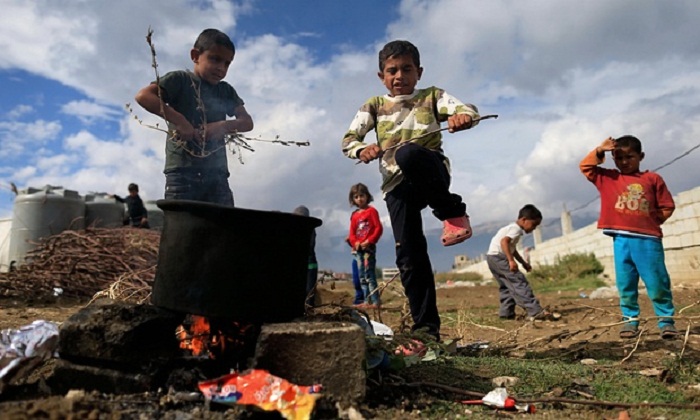Lack of food means Syrian children face `irreversible` health issues - UN

Dina El Kassaby, a spokeswoman for WFP, says ongoing funding problems mean the agency can’t ensure that young children are getting sufficient nutrients or that pregnant women are getting the nutrition they need to give their children a healthy start in life. The organisation provides rations and food aid to 4 million people within Syria and another 1.5 million who are displaced across the region.
She said: “We are seeing now that families are eating less nutritious food. Rather than fresh foods they are buying rice and pasta, food that will fill them for longer – but this means they aren’t getting the level of micronutrients they need. Nearly all the mothers I met are skipping meals so their children can have more food.”
WFP tries to ensure that breastfeeding and pregnant women get extra vouchers so they can buy fresh food or meat. But El Kassaby says this is not always possible. “The value of the vouchers was reduced several times in 2015, so many families coped by purchasing less expensive staple food items to ensure that the value of the voucher would stretch to cover a longer period of time.
“This is a major cause of concern for us. The first 1,000 days of a child’s life, from conception to the end of the second year, is absolutely critical. Malnutrition in those early years can be largely irreversible and causes delays in growth as well as mental health problems.”
Of a population of around 22 million, 6.3 million Syrians are food insecure. This means they don’t have sufficient access to nutritious food. The UN children’s agency, Unicef, warned in its 2015 report into the vulnerability of Syrian refugees in Lebanon that two-thirds of children under five had less than three cooked meals a day, compared to half in 2014. Only 3% of infants between six and 17 months had a “minimum acceptable diet”, mainly because of fewer meals and poor nutritional diversity.
From pregnancy, through breastfeeding and infant diet, malnutrition in the early months and years can damage a child’s brain, impair the immune system, and cause stunting, where the child’s body stops growing properly.
This year has seen food rations for Syrian refugees seesaw. Cuts, some of which have since been reversed, have left the most vulnerable groups with only $14 a month and removed rations from hundreds of thousands of households altogether. In September, the WFP dropped a third of Syrians from its food assistance programme, including more than 200,000 displaced people living in Jordan.
In October, a donation of $30m from the European Commission meant that WFP could restart funds to those who lost support earlier in the year, and increase provision for the most vulnerable. But that support is only 80% of what nutritional experts say is needed.
El Kassaby says that there is not enough money to keep helping Syrians and vulnerable refugees in neighbouring countries through the first months of 2016.
“Right now, looking ahead to May we are short of $358m out of a total funding requirement of $639m. We have had donors stepping up since September but we really need a predictable and sustainable source of funding. We don’t want to send texts to people telling them that this month they will only get half their usual food support. I just feel helpless, knowing that we do our best but it is still not good enough.”
WFP is carrying out a special programme within Syria to give children extra vitamins through snacks provided at school. El Kassaby says the programme is vital for children but won’t be able to expand unless more funding is found.
“We are buying local dates and making them into fortified high nutrition cookies and it gives the kids they energy they need. These children would have been going without breakfast before this so it’s an incentive for their parents to send them in to school.
“We would like to expand this scheme but it’s very difficult without funding levels that are predictable and regular.”
Henry Sebuliba, a nutritionist with Unicef, adds: “We are so far not seeing levels of malnutrition rising above the dangerous levels of 3% of the child population. But we have to focus on food insecurity – that is the problem for the future.”
The food crisis is made worse by the increasing debt levels of many families, as four years of displacement bites heavily into savings. Agencies warn that debt creates a vicious cycle, whereby refugees become more dependent on the fluctuating food vouchers, and less able to cope without them.
An assessment of more than 4,000 refugee households by UNHCR, Unicef and WFP found that nearly 90% are more in debt than they were a year ago.
The percentage of refugee households buying food on credit has jumped to more than 75%, from 30% in 2014.
Experts working with child refugees say that it is not only physical health that is being threatened by the funding crisis. A report out last week by Save the Children highlighted the mental health problems that are being exacerbated by the lack of support services for severely traumatised children.
“The repercussions for the future mental health of an entire generation could be catastrophic,” said Ian Rodgers, country director for Save the Children in Lebanon.
“In addition to the obvious psychological damage caused by witnessing traumatic events and extreme violence, there are a myriad of secondary, under-funded and often overlooked, daily causes of psychological and social damage once a displaced child arrives in a new community.”















































